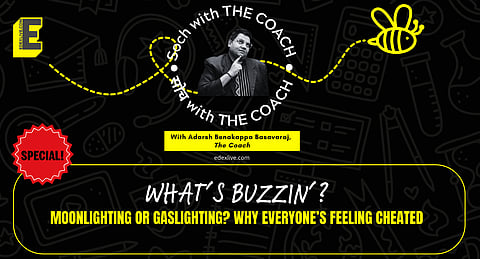

Hello, my dears!
Let’s talk about Soham Parekh — the techie who took multi-tasking to such a legendary level, even AI would’ve needed an upgrade to keep up.
This guy was working with multiple start-ups at the same time, moonlighting his way through what he called a “financial crisis.” Noble intention? Maybe. Legal? Eh. Ethical? That’s the curveball, and that's what I want to discuss today.
Before we grab our digital pitchforks or turn his LinkedIn into a roast fest, let’s pause, take a breath and analyse...What really happened here? Let’s decode the dilemma:
The rise of the ‘140-Hour’ week warrior
Soham clocked in a jaw-dropping 140 hours a week. That’s not ambition, that’s industrial revolution-level burnout. How effective and efficient was he? That's the million-dollar question. And let’s get real — several of us are just one bad EMI or medical emergency away from considering the same.
Financial instability is a brutal motivator. But here's the deal — moonlighting isn’t just about hustling hard, it’s about breaching trust, and that's a 'career ender' in today's business world.
Remember: Companies hire you for your mindshare, your focus, your energy. Not for you to Ctrl+C your skills across five different Slack groups under five different names. That’s not hustle. That’s chaos, and it’s not sustainable.
When the side hustle turns into a slide hustle — let’s strip the jargon. What’s really wrong with moonlighting?
1. Breach of contract: Most employment agreements clearly mention “no other employment.” Read the fine print, folks.
2. Productivity dips: You may think you’re superhuman, but your quality will suffer.
3. Mental Health SOS: Burnout, zero personal life, deteriorating health — and for what? A few extra bucks and a LinkedIn post with #grindmode?
And now the big one:
4. Legal implications: Yes, you can get sued. And trust me, no court is going to give you a standing ovation for overworking.
But wait — what if I really need the money?
Now we’re talking.
Let’s not ignore the elephant in the room — salaries often don’t match cost of living. So how do you make it work without becoming a full-time stealth agent? But it all mainly revolves around having a system, how do I know?
I made the same mistakes and am in the same boat as Soham, and hence wouldn't want you to go through the same grind.
Here’s your financial Plan B (without a corporate bounty on your head):
1. Mutual Funds – SIP (Systematic Investment Plan) your way to sanity. Long-term, low-effort.
2. Fixed Deposits or FDs – Your classic, safe “I’m-old-but-I-still-work” friend.
3. Freelancing, the legal kind – If your company permits it, take on side projects and consult. Just disclose it.
4. Skill monetisation – Make reels, write eBooks, start an online course. You’ve got talent? Package it.
5. Affiliate marketing – Promote what you love, get paid. But again — integrity over income, always
6. Content creation: Yes! Everyone's talking about it and it's saturated, but if you're good at what you do and can communicate it well, combine this with affiliate marketing and boom! You've got a pretty good side hustle.
My final thoughts:
Soham's story isn’t about a fraudster. It’s about a broken system where financial literacy is low, expectations are high, and pay is mediocre. We don’t need more rules. We need more awareness.
Moonlighting might make you richer today, But moonsliding your ethics can bankrupt your reputation forever, and why do I also bring in Gaslighting? Well, don't you think that you're gaslighting employers by working for different forms at the same time?
I'll leave you to it...
With Regards,
Adarsh Benakappa Basavaraj
Your Coach, who strives to keep your hustle honest (and legal)
